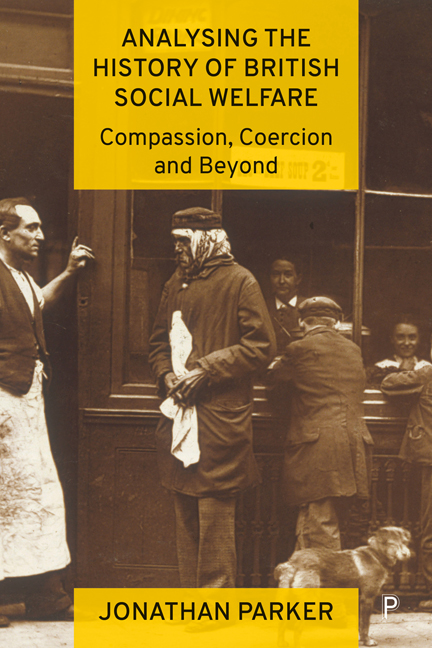Book contents
- Frontmatter
- Contents
- List of tables
- List of abbreviations
- About the author
- Acknowledgements
- 1 Concepts, continuities and critique
- 2 A brief history of British social welfare
- 3 Philosophical binaries and normative judgements
- 4 Chocolate, flowers and social welfare reform
- 5 War: the paradoxical crucible of welfare reform
- 6 Gendered perspectives on welfare
- 7 Piacular austerity: sacrificing the poor for the rich
- 8 Universal Credit versus Universal Basic Income: strange bedfellows?
- 9 Universal Credit versus Universal Basic Income: strange bedfellows?
- 10 W(h)ither welfare after Brexit and COVID-19?
- References
- Index
4 - Chocolate, flowers and social welfare reform
Published online by Cambridge University Press: 20 January 2024
- Frontmatter
- Contents
- List of tables
- List of abbreviations
- About the author
- Acknowledgements
- 1 Concepts, continuities and critique
- 2 A brief history of British social welfare
- 3 Philosophical binaries and normative judgements
- 4 Chocolate, flowers and social welfare reform
- 5 War: the paradoxical crucible of welfare reform
- 6 Gendered perspectives on welfare
- 7 Piacular austerity: sacrificing the poor for the rich
- 8 Universal Credit versus Universal Basic Income: strange bedfellows?
- 9 Universal Credit versus Universal Basic Income: strange bedfellows?
- 10 W(h)ither welfare after Brexit and COVID-19?
- References
- Index
Summary
Social welfare's complex rationales and development has been intertwined with state, religious and voluntary effort throughout its history, as introduced in Chapter 2. This chapter builds on that multifaceted base and examines the centrality of religion-inspired and humanistic philanthropy and voluntarism in the development of social welfare and its continuation within contemporary policy and practices. These broad drivers represent a means of addressing the twin goals of economic productivity and human compassion; integral parts of a complex and twisted double helix in the historical development of social welfare in Britain that developed alongside social administration, policy and state provision. Voluntarism is associated with both collaboration and collective actions as well as a means of regulation and moral control across social strata. Our excursus shows that the goals of welfare are not always singular in purpose nor are they always clear. They are messy and complex, exposing some of the ambivalence associated with human support and social welfare.
In the context of Elizabethan Poor Law and Poor Law reform in the 19th century, we will consider the work of some key philanthropic characters in the development of social welfare including the chocolatiers the Frys in Bristol, Cadburys in Birmingham and the Rowntrees in York, and those businesses involved in the development of garden cities, such as James Reckitt in Hull and the Lever brothers at Port Sunlight on the Wirral in Cheshire. The context will also acknowledge the changing political landscape of the 19th century in which calls for factory and labour reform, health improvements, education and increased enfranchisement began to grow in strength as the agrarian landscape morphed into industrial conurbations and social need correspondingly increased. Alongside these changes, charitable bodies concerned for the moral welfare of individuals, often religiously inspired, methodical and formal in outlook, also secured traction in the panoply of welfare provision, the most renowned of these for the development of the personal social services being the Charitable Organisation Society founded in 1869. Towards the end of the 19th and early 20th centuries, and inextricably connected with concomitant sociopolitical change, came the beginnings of systematic and applied sociology taking shape through the survey work of Seebohm Rowntree and Charles Booth.
- Type
- Chapter
- Information
- Analysing the History of British Social WelfareCompassion, Coercion and Beyond, pp. 62 - 81Publisher: Bristol University PressPrint publication year: 2023



